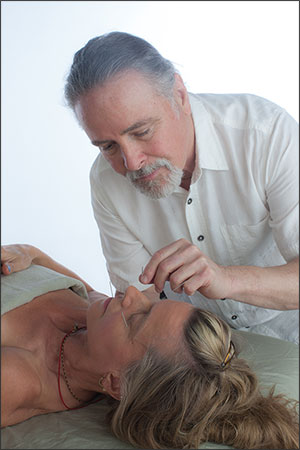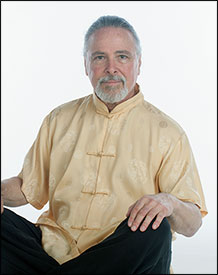Acupuncture
What is Acupuncture?
Acupuncture is one of the oldest time-tested forms of medical treatment in the world. It has been a major part of primary healthcare in China for the last 5,000 years. Acupuncture is used for a variety of medical needs, ranging from the prevention and treatment of disease to pain relief and anesthetizing patients for surgery or dentistry.
As in many oriental medicine practices, one emphasis of acupuncture is on prevention, and on treating problems before they reach serious stages. In traditional Chinese medicine, the highest form of acupuncture treatment was given to enable people to live long and healthy lives.
Acupuncture literally means needle piercing, the practice of inserting very fine needles into the skin to stimulate specific anatomic points in the body (called acupoints) for therapeutic purposes.
Practitioners may also use heat, pressure, friction, suction, or electrical impulses to stimulate the points. The acupoints are stimulated to balance the movement of energy (qi) in the body to restore health.
There are different styles of acupuncture practiced throughout China today. Although acupuncture began in China, Korea, Tibet and Japan each have developed their own unique styles and approaches to acupuncture.
How can Acupuncture help me?
Acupuncture is best known for the control of pain. However, acupuncture can treat a wide variety of common and uncommon health problems.
In the United States, acupuncture is used frequently for the treatment of chronic pain conditions such as arthritis, bursitis, headache, athletic injuries, and post-traumatic and post-surgical pain. It is also used for treating chronic pain associated with immune function dysfunction such as psoriasis (skin disorders), fibromyalgia, allergies, and asthma.
Acupuncture is also found to be effective for the treatment of mind-body disorders such as anxiety, chronic fatigue, irritable bowel syndrome, hypertension, insomnia, PMS, menopausal symptoms, and depression. Modern applications of acupuncture include the treatment of alcoholism, addiction, smoking, and eating disorders.

The following is a list of just some disorders that can be treated by acupuncture (from World Health Organization):
Respiratory
• Acute Sinusitis
• Acute rhinitis
• Common cold
• Acute tonsillitis
• Acute bronchitis
• Bronchial asthma
Eye
• Acute conjunctivitis (pinkeye)
• Nearsightedness (in children)
• Cataract (without complications)
Mouth
• Toothache, pre & post extraction pain
• Gingivitis (gum disease)
• Acute and chronic pharyngitis
Gastrointestinal Disorders
• Hiccups
• Gastritis
• Gastric Hyperacidity
• Ulcers
• Colitis
• Constipation
• Diarrhea
• Paralytic ileus
Neurological and Musculoskeletal Disorders
• Headache and migraine
• Trigeminal neuralgia
• Paralysis following stroke
• Meniere's disease
• Neurogenic bladder dysfunction
• Nocturnal enuresis (bed wetting)
• Intercostal neuralgia (pain in the ribs)
• Cervicobrachial syndrome (pain radiating from neck to arm)
• Frozen shoulder or Tennis elbow
• Sciatica
• Low back pain
• Osteoarthritis
Our standard new patient fee is $190. This includes your initial consultation, examination, diagnosis, and acupuncture treatment. Your initial visit usually takes from one to one and a half hours. If the problem is more extensive, if there are multiple health issues, if more than one treatment modality is required, or if dietary and Chinese physical therapy exercise counseling are needed, the fees may be slightly higher. Follow-up visits are $145, and include examination, updated history, acupuncture treatment, and Chinese patent medicine prescriptions where needed. Sliding scale for those in financial need.
More and more insurance plans are covering acupuncture treatments. Co-payments, deductibles, and annual treatment maximums may apply. If you have a flex-pay plan, you can almost always use those monies for acupuncture care. We will be happy to inquire with your insurance company in advance to determine if your plan covers acupuncture.
 Jampa Mackenzie Stewart is a respected clinical acupuncturist, teacher and author. He received his clinical training in acupuncture and Chinese Medicine at Southwest Acupuncture College in Santa Fe, NM, and holds a Masters of Science degree in Oriental Medicine. In 1994 he entered clinical practice and received his license as a Doctor of Oriental Medicine from the New Mexico Board of Acupuncture and Oriental Medicine, and his national board certification in acupuncture from the National Commission for the Certification of Acupuncture and Oriental Medicine (NCCAOM). In 1997, he was invited to teach at the prestigious Academy of Oriental Medicine at Austin, TX, where he was licensed by the Texas State Board of Medical Examiners.
Jampa Mackenzie Stewart is a respected clinical acupuncturist, teacher and author. He received his clinical training in acupuncture and Chinese Medicine at Southwest Acupuncture College in Santa Fe, NM, and holds a Masters of Science degree in Oriental Medicine. In 1994 he entered clinical practice and received his license as a Doctor of Oriental Medicine from the New Mexico Board of Acupuncture and Oriental Medicine, and his national board certification in acupuncture from the National Commission for the Certification of Acupuncture and Oriental Medicine (NCCAOM). In 1997, he was invited to teach at the prestigious Academy of Oriental Medicine at Austin, TX, where he was licensed by the Texas State Board of Medical Examiners.Request an Appt.
